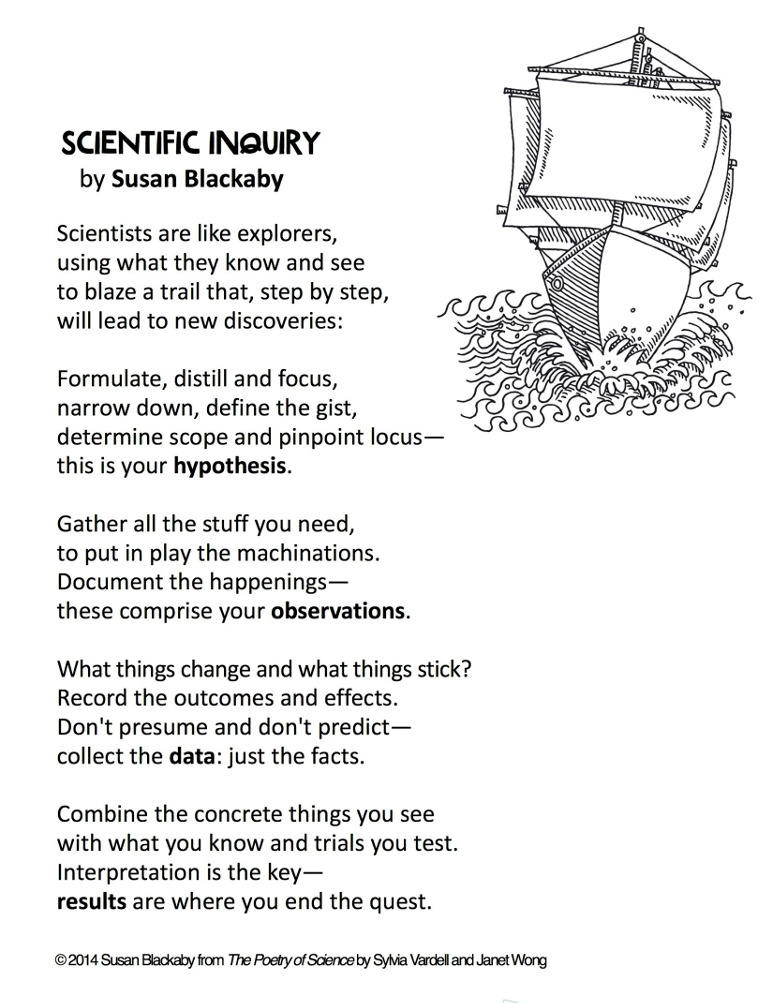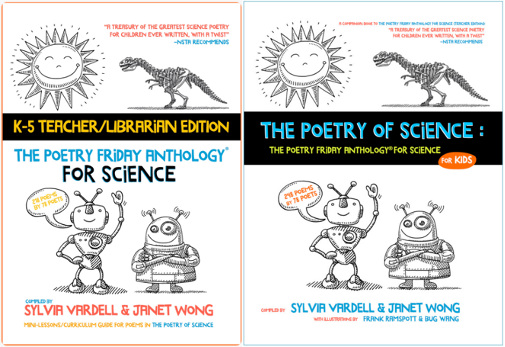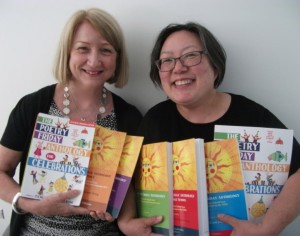Grade Level
3 - 5
minutes
15 min - 1 hr
subject
English Language Arts
Activity Type:
poetry, scientific inquiry
Introduction
In “Scientific Inquiry,” children’s poet Susan Blackaby introduces us in an entertaining and memorable way to remember key vocabulary words used by scientists and engineers. Here is Blackaby’s poem, one of 200+ poems in The Poetry Friday Anthology for Science, edited by Sylvia Vardell and Janet Wong. After reading this poem aloud to your students, you can show this video, created by Sherry Dill, as a way to present the poem in an additional format.

“Take 5” Mini-Lesson
Here is a Take 5 Mini-Lesson that makes it quick and easy to share this poem!
- Before sharing this poem, alert students to listen for four key science terms that are essential to scientific exploration (hypothesis, observations, data, results). Read the poem aloud and then discuss those terms together
- Read the poem again, and invite students to say the key science words that appear in bold.
- Use this poem to talk about each step in the inquiry process. Collaborate to create a quick digital interactive poster (try postermywall.com), pulling together images to illustrate the key words. Show the students the choices of text, fonts, color, graphics, and even animation, if possible, while you input those items and create the finished product.
- Point out that all scientists use scientific methods during laboratory and outdoor investigations. They analyze, evaluate, and critique scientific explanations by using empirical evidence, logical reasoning, and experimental and observational testing, including examining all sides of the evidence. Challenge students to use some of the vocabulary words from “Scientific Inquiry” to describe various steps of an investigation or an engineering exercise such as the one featured in the poems “Designing an Experiment: Will a Car Roll Faster Down a Steeper Slant?” by Avis Harley or “Paper Airplanes” by Janet Wong.
- Pair this poem with “Scientific Steps” by Cynthia Cotten (A Poem for Everyone, page 23) and look for Spectacular Science: A Book of Poems edited by Lee Bennett Hopkins.
Step It Up!
If time allows, extend the Take 5 Mini-Lesson with one of the following activities:
Dig for Meaning
Identify all of the words in the poem that have a possible science connection. (For instance, a word like distill, which originally was used only to describe the scientific process of separating out substances dissolved in a liquid, now means, “to take the most important parts of an idea.”)
Chart Some Science Explorers
Build on the simile in Blackaby’s first stanza (“Scientists are like explorers . . . ”), and identify some famous explorers in science history. Using online searches, try to select individuals from at least three different continents.
Diverse Formats/Media
Discuss whether you experience the poem differently, depending on its format (e.g., simple text reading, poem movie, and digital poster). Do certain words or elements of the poem stand out to you in different formats?
Additional Literacy + Science Resources
Books
A Framework for K-12 Science Education: Practices, Cross-Cutting Concepts, and Core Ideas by Helen Quinn, Heidi Schweingruber, and Thomas Keller, Editors; Committee on Conceptual Framework for the New K-12 Science Education Standards; Board on Science Education; Division of Behavioral and Social Sciences and Education; National Research Council (National Academies Press, 2012). In particular, see “Scientific and Engineering Practices,” Chapter 3.
The Poetry Friday Anthology for Science: Poems for the School Year Integrating Science, Reading, and Language Arts (K-5 Teacher/Librarian Edition) by Sylvia Vardell and Janet Wong (Pomelo Books, 2014). Each of the 218 poems in this book comes with a Take 5 Mini-Lesson that suggests ways to teach the poem.
The Poetry of Science: The Poetry Friday Anthology for Science for KIDS by Sylvia Vardell and Janet Wong (Pomelo Books, 2015). This illustrated children’s edition contains the 218 poems in The Poetry Friday Anthology for Science (K-5 Teacher/Librarian Edition) plus 30 additional Bonus poems.

Articles
Vardell, S. M. and Wong, J. (2015). The symbiosis of science and poetry. Children and Libraries. Spring, 13, (1), 15-18.
Vardell, S. M. and Wong, J. (2014). Observe, explain, connect. Science and Children. 51, (8), April/May, 31-35.
Miscellaneous
Standards
Next Generation Science Standards
3-PS2-1: Science and Engineering Practices: Scientific Investigations Use a Variety of Methods
Common Core State Standards – English Language Arts
CCSS.ELA-Literacy.RI.5.4: Determine the meaning of general academic and domain-specific words and phrases in a text relevant to a grade 5 topic or subject area. (also RI.4.4 and RI.3.4)
CCSS.ELA-Literacy.RL.5.4: Determine the meaning of words and phrases as they are used in a text, including figurative language such as metaphors and similes. (also RL.4.4 and RL.3.4)
CCSS.ELA-Literacy.SL.5.2: Summarize a written text read aloud or information presented in diverse media and formats, including visually, quantitatively, and orally. (also SL.4.2 and SL.3.2)
Meet the Writer/About Pomelo Books
Sylvia Vardell and  Janet Wong are the creative forces behind Pomelo Books and The Poetry Friday Anthology® series, launched in 2012 and adopted by hundreds of school districts nationwide.
Janet Wong are the creative forces behind Pomelo Books and The Poetry Friday Anthology® series, launched in 2012 and adopted by hundreds of school districts nationwide.
Sylvia Vardell is Professor in the School of Library and Information Studies at Texas Woman¹s University. She has published extensively, including five books on literature for children and over 100 journal articles. Her current work focuses on poetry for children, including a regular blog, PoetryforChildren. She is also the regular “Everyday Poetry” columnist for ALA’s BookLinks magazine and the 2014 recipient of the ALA Scholastic Library Publishing Award.
Janet Wong is a graduate of Yale Law School and former lawyer who switched careers and became a children’s poet. Her dramatic career change has been featured on The Oprah Winfrey Show, CNN’s Paula Zahn Show, and Radical Sabbatical. She is the author of 30 books for children and teens on a wide variety of subjects, including writing and revision, creative recycling, diversity, and chess.
Educator's Toolbox
Meet the Writer
About Pomelo Books
@pomelobooksPomelo Books is the publisher of The Poetry Friday Anthology® series, dedicated to helping teachers and librarians teach poetry easily while meeting national and state standards.

